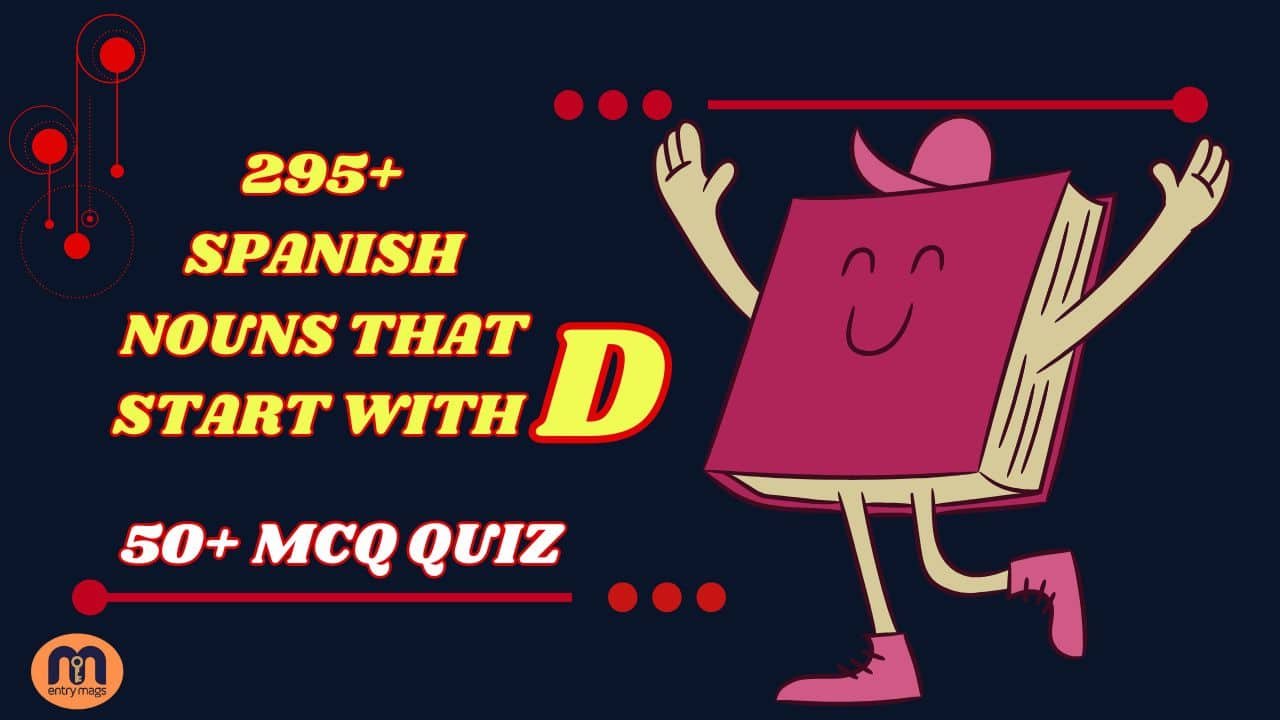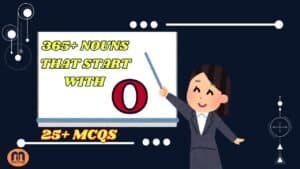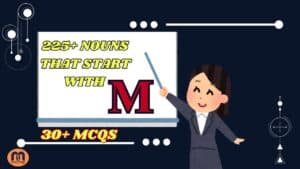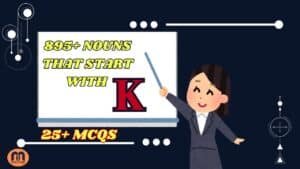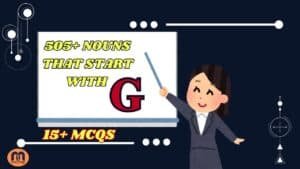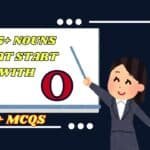Spanish Nouns That Start With D: Learning a new language can feel like a puzzle the more pieces you have, the clearer the picture becomes.
If you’re working on expanding your Spanish vocabulary, one of the best ways to do so is by focusing on categories of words. Today, we’re diving into an exciting area:
Spanish nouns that start with the letter D. Whether you’re a beginner or an advanced learner, this list of nouns will help enhance your Spanish and add depth to your communication.
But don’t worry, we won’t just list words we’ll guide you through useful categories, examples, and tips to make it easier to understand and remember.
Why Focus on Nouns That Start With “D”?
In any language, nouns are essential. They form the building blocks of sentences and help us describe the world around us.
By focusing on a specific letter like “D,” you can systematically increase your vocabulary, making the process more digestible and manageable.
Plus, once you’ve mastered a few basic nouns that start with “D,” you can start to create more complex sentences and expand your conversational ability.
Let’s explore some of the most useful and interesting Spanish nouns beginning with D across different categories.
Common Spanish Nouns Starting with D
Everyday Life and Essentials
Some nouns are so commonly used in daily life that you’ll encounter them often in conversations, books, and media. These words are a great starting point for building your vocabulary.
- Día (day)
- Documento (document)
- Dinero (money)
- Dedo (finger)
- Desayuno (breakfast)
- Ducha (shower)
- Dolor (pain)
- Descanso (rest)
Each of these words can be used in practical, real-world scenarios.
For example, “Hoy es un buen día” means “Today is a good day,” and “¿Tienes dinero?” means “Do you have money?”
Nature and Environment
Nouns that relate to nature can be a fun and insightful way to connect with the world around you in Spanish.
- Bosque (forest)
- Desierto (desert)
- Día soleado (sunny day)
- Duende (goblin, elf)
- Duna (dune)
- Delmar (sea)
Imagine using “Me gusta caminar por el bosque” (“I like walking through the forest”) or “El desierto es muy cálido” (“The desert is very hot”). These words will definitely help paint vivid pictures when you speak.
People and Relationships
We all communicate with and about people. Learning nouns that describe different relationships or roles in life will help you connect with others.
- Deporte (sport)
- Duda (doubt)
- Doctor (doctor)
- Divorcio (divorce)
- Débil (weak)
- Don (gift, talent)
For example, “Tengo una duda” means “I have a question/doubt,” while “El doctor me dio una receta” translates to “The doctor gave me a prescription.” These are practical phrases that can help in many contexts.
Family and Relationships
In Spanish, there are many nouns related to family and relationships that start with D. These words are useful in conversations about family dynamics, emotions, and social interactions.
- Dama (lady)
- Dedo (finger)
- Día (day)
- Dilema (dilemma)
- Dinero (money)
- Despedida (farewell)
- Dulzura (sweetness)
- Dote (dowry)
- Debate (debate)
- Desconfianza (distrust)
- Demanda (demand)
- Desentendimiento (misunderstanding)
- Divorcio (divorce)
- Dedicación (dedication)
- Descendencia (descendants)
- Desgaste (wear and tear)
- Desgaste (weariness)
- Desilusión (disillusionment)
- Desdén (disdain)
- Difusión (dissemination)
- Dinamismo (dynamism)
- Debilidad (weakness)
- Dilatación (expansion)
- Decepción (disappointment)
- Dependencia (dependence)
Work and Profession
These nouns refer to jobs, roles, and professional terms. They are essential for discussing careers and workplaces in Spanish.
- Doctor (doctor)
- Dentista (dentist)
- Desarrollador/a (developer)
- Diseñador/a (designer)
- Director/a (director)
- Dependiente/a (salesperson)
- Demócrata (democrat)
- Discípulo/a (disciple)
- Dibujante (draftsman, illustrator)
- Diplomático/a (diplomat)
- Dirigente (leader)
- Desempleado/a (unemployed person)
- Defensor/a (defender)
- Detallista (retailer)
- Destruidor/a (destroyer)
- Docente (educator)
- Desarrolladora de software (software developer)
- Delegado/a (delegate)
- Detective (detective)
- Decano/a (dean)
- Diseñador/a gráfico/a (graphic designer)
- Demostrador/a (demonstrator)
- Drogadicto/a (drug addict)
- Dactilógrafo/a (typist)
- Demonólogo/a (demonologist)
Food and Drinks
In this category, you’ll find terms for food items, beverages, and cooking-related concepts. Perfect for talking about meals and dining experiences in Spanish.
- Dulce (sweet, candy)
- Desayuno (breakfast)
- Dieta (diet)
- Dona (doughnut)
- Durazno (peach)
- Dátiles (dates)
- Dulzura (sweetness)
- Diosa (goddess – metaphorically for food)
- Dulce de leche (caramel)
- Distinto (different, sometimes related to food)
- Desinfectante (disinfectant)
- Doble crema (double cream)
- Devorador/a (devourer)
- División (division, as in food categories)
- Desglosado (dissected, portioned food)
- Dulzón (sweetish)
- Despensa (pantry)
- Diente de león (dandelion – herb used in food)
- Dumplings (dumplings)
- Decadente (decadent – desserts)
- Dique (dam, metaphorically in food preservation)
- De sabor (of flavor)
- Deshidratado/a (dehydrated)
- Dificultoso/a (difficult, in preparation)
- Diversidad de platos (diversity of dishes)
Travel and Geography
These nouns refer to travel, locations, and geographical terms. They are vital for discussing places, travel plans, and the natural world in Spanish.
- Destino (destination)
- Distancia (distance)
- Dirección (direction)
- Día soleado (sunny day)
- Duna (dune)
- Desierto (desert)
- Delmar (sea)
- Dársena (dock, harbor)
- Dique (dam)
- Desembocadura (mouth of a river)
- Desplazamiento (displacement)
- Desvío (detour)
- Desolación (desolation)
- Dirección postal (postal address)
- Domicilio (residence, address)
- Densidad (density)
- Derrumbe (collapse)
- Degradación (degradation)
- Despeje (clearance)
- Desbordamiento (overflow)
- Dilatación (expansion)
- Declive (decline)
- Densidad de tráfico (traffic density)
- Desembarco (disembarkation)
- Descubrimiento (discovery)
Emotions and States
These nouns describe emotional states, feelings, and mental conditions. They’re crucial for expressing emotional experiences and moods in Spanish.
- Desesperación (desperation)
- Duda (doubt)
- Decepción (disappointment)
- Desánimo (discouragement)
- Desgaste (wear)
- Desilusión (disillusionment)
- Déficit (deficit)
- Derrumbe emocional (emotional collapse)
- Disgusto (disgust)
- Desconcierto (confusion)
- Dolor (pain)
- Desconfianza (distrust)
- Desplome (collapse)
- Deseo (desire)
- Desgano (lack of enthusiasm)
- Desesperanza (hopelessness)
- Descontrol (loss of control)
- Desbordamiento emocional (emotional overflow)
- Desafecto (disaffection)
- Demonio (demon)
- Desdén (disdain)
- Descontento (discontent)
- Desbordado/a (overwhelmed)
- Dulzura (gentleness, sweetness)
- Desolación (desolation)
Time and Events
These nouns are useful for discussing time, specific events, and occurrences. Perfect for describing daily routines, holidays, and other time-related contexts in Spanish.
- Día (day)
- Despedida (farewell)
- Día festivo (holiday)
- Duración (duration)
- Desviación (deviation)
- Descanso (rest)
- Día laborable (workday)
- Día de la semana (weekday)
- Despertar (awakening)
- Día de campo (outing, picnic)
- Día libre (day off)
- Diferencia horaria (time difference)
- Decomiso (seizure, related to events)
- División del tiempo (division of time)
- Desaceleración (deceleration)
- Desfase (misalignment)
- Disputa (dispute)
- Despertador (alarm clock)
- Desajuste (mismatch)
- Desconcierto (confusion)
- Día a día (day by day)
- Descubrimiento (discovery)
- Desmoronamiento (crumbling)
- Días contados (counted days)
Objects and Things
This category includes a variety of nouns related to objects, tools, and physical items. These words are helpful in everyday conversations about things, gadgets, and materials.
- Disco (disk)
- Dedo (finger)
- Dólar (dollar)
- Decoración (decoration)
- Destello (sparkle, flash)
- Destornillador (screwdriver)
- Dibujo (drawing)
- Densidad (density)
- Dijes (charms, pendants)
- Demostración (demonstration)
- Dispositivo (device)
- Diente (tooth)
- Dron (drone)
- Detector (detector)
- Desinfectante (disinfectant)
- Durazno (peach)
- Doble (double)
- Diana (target)
- Difusor (diffuser)
- Drapería (drapery)
- Diadema (tiara, headband)
- Dinamita (dynamite)
- Ducha (shower)
- Doble cara (double-faced)
- Diploma (diploma)
Dynamic and Modern Life
In today’s fast-paced world, language evolves alongside technology, trends, and modern living. These Spanish nouns starting with D reflect the dynamic nature of contemporary life, from gadgets to societal concepts.
- Dispositivo (device)
- Dron (drone)
- Descubrimiento (discovery)
- Desarrollador/a (developer)
- Domicilio (residence)
- Día libre (day off)
- Desafío (challenge)
- Diferencia (difference)
- Desgaste (wear)
- Detrás (back, behind)
- Documento (document)
- Datos (data)
- Demostración (demonstration)
- Dominio (domain)
- Densidad (density)
- Dólar (dollar)
- Descanso (rest)
- Decisión (decision)
- Despegue (takeoff)
- Desempeño (performance)
- Desarrollo (development)
- Desinformación (misinformation)
- Desafortunado/a (unfortunate)
- Divulgación (disclosure)
- Destrucción (destruction)
Dazzling and Creative Minds
For those with a passion for art, innovation, and self-expression, these vibrant Spanish nouns capture the essence of creativity. From the arts to unique ideas, these D-starting nouns can help ignite your imagination.
- Dibujo (drawing)
- Diseño (design)
- Dramaturgo/a (playwright)
- Danza (dance)
- Dúo (duo)
- Dicha (happiness, joy)
- Decadencia (decadence)
- Dramaticidad (dramatic quality)
- Diversión (fun)
- Destreza (skill, dexterity)
- Disfraz (costume)
- Disposición (disposition)
- Dibujo animado (cartoon)
- Doble (double – as in a double act or concept)
- Dote (gift, talent)
- Danza contemporánea (contemporary dance)
- Deidad (deity)
- Dicha (bliss)
- Desafío artístico (artistic challenge)
- Delirio (delirium, wild excitement)
- Desenlace (outcome, conclusion)
- Decoración (decoration)
- Deslumbrante (dazzling)
- Diversidad (diversity)
- Determinación (determination)
Adjectives Associated with Spanish Nouns Starting with D
Now that we’ve explored some nouns, let’s look at adjectives that commonly go hand in hand with them. These will help you add more description and flair to your sentences.
Describing Physical Attributes
- Delgado/a (slim)
- Duro/a (hard)
- Dulce (sweet)
- Débil (weak)
For example:
- “La mesa es dura” (“The table is hard”)
- “Mi hermana es dulce” (“My sister is sweet”)
Describing Conditions or States
- Difícil (difficult)
- Divertido/a (fun)
- Dañado/a (damaged)
- Delicado/a (delicate)
In context:
- “Este examen es difícil” (“This exam is difficult”)
- “La situación está delicada” (“The situation is delicate”)
Describing Emotions or Feelings
- Deprimido/a (depressed)
- Desesperado/a (desperate)
- Desilusionado/a (disillusioned)
For example:
- “Me siento deprimido” (“I feel depressed”)
- “Está desesperado por encontrar trabajo” (“He is desperate to find work”)
Describing Qualities of People
- Dedicado/a (dedicated)
- Digno/a (worthy)
- Dócil (docile)
For instance:
- “Es una persona muy dedicada” (“She is a very dedicated person”)
- “Ese comportamiento es digno de admiración” (“That behavior is worthy of admiration”)
Tips for Memorizing Nouns and Adjectives
Learning vocabulary can sometimes feel overwhelming, but there are strategies that can make the process smoother.
- Use Flashcards: Create flashcards for each noun and adjective. On one side, write the Spanish word; on the other, its meaning or a picture that represents it.
- Practice in Context: Don’t just memorize words try to use them in sentences. Practice speaking or writing with the new words you’ve learned.
- Categorize: By organizing words into categories (like nature, relationships, physical traits), your brain can more easily make connections, improving retention.
- Use Spaced Repetition: Review the words regularly but at spaced intervals, so you keep them fresh in your mind over time.
- Pair With a Language Partner: Conversing with a native speaker or language partner is one of the most effective ways to reinforce new vocabulary.
Conclusion
By focusing on nouns that start with D, you’ve just unlocked a wealth of vocabulary that can greatly enrich your Spanish fluency.
Not only will these words help you speak more confidently, but they’ll also allow you to describe the world around you in a more nuanced and vivid way.
Remember that consistency is key, and by practicing these nouns and their associated adjectives, you’ll be well on your way to mastering Spanish.
Next time you’re studying, try to incorporate some of these nouns into your sentences. Before you know it, you’ll be using them in conversations with ease!
Keep up the great work, and remember language learning is a journey, not a race. [Spanish Nouns That Start With D]
MCQs Quiz: Spanish Nouns That Start With D
1. Which of the following is the Spanish noun for “device”?
- A) Dólar
- B) Dispositivo
- C) Dedo
- D) Dibujo
Answer: B) Dispositivo
2. What does the Spanish word “Dulzura” mean?
- A) Sweetness
- B) Salt
- C) Sourness
- D) Spiciness
Answer: A) Sweetness
3. Which of these nouns refers to a “drone” in Spanish?
- A) Dato
- B) Dron
- C) Dinero
- D) Dilema
Answer: B) Dron
4. The Spanish word “Despedida” translates to which of the following in English?
- A) Reconciliation
- B) Farewell
- C) Birthday
- D) Meeting
Answer: B) Farewell
5. What is the meaning of “Día festivo” in Spanish?
- A) Workday
- B) Holiday
- C) Morning
- D) Afternoon
Answer: B) Holiday
6. Which noun refers to a “playwright” in Spanish?
- A) Doble
- B) Dramaturgo/a
- C) Dibujo
- D) Día
Answer: B) Dramaturgo/a
7. “Dólar” is the Spanish noun for
- A) Dollar
- B) Document
- C) Diagram
- D) Detail
Answer: A) Dollar
8. Which noun means “destruction” in Spanish?
- A) Decisión
- B) Destino
- C) Destrucción
- D) Distancia
Answer: C) Destrucción
9. The Spanish noun “Dote” refers to what?
- A) Talent or gift
- B) Problem
- C) Holiday
- D) Confusion
Answer: A) Talent or gift
10. “Desarrollo” means:
- A) Destruction
- B) Development
- C) Decline
- D) Demand
Answer: B) Development
11. Which of the following translates to “data” in Spanish?
- A) Documento
- B) Datos
- C) Dedo
- D) Dirección
Answer: B) Datos
12. “Diversión” in Spanish means:
- A) Fun
- B) Disaster
- C) Delay
- D) Distance
Answer: A) Fun
13. Which noun refers to a “target” in Spanish?
- A) Dilema
- B) Diana
- C) Densidad
- D) Dibujo
Answer: B) Diana
14. The word “Despeje” can be translated as:
- A) Breakdown
- B) Clearance
- C) Celebration
- D) Design
Answer: B) Clearance
15. “Dulce de leche” refers to:
- A) A savory sauce
- B) A candy
- C) Caramel
- D) A vegetable
Answer: C) Caramel
16. The Spanish noun “Días contados” means:
- A) Days counted (short period of time)
- B) Happy days
- C) Working days
- D) Rest days
Answer: A) Days counted (short period of time)
17. “Desilusión” translates to:
- A) Joy
- B) Disillusionment
- C) Dispute
- D) Discovery
Answer: B) Disillusionment
18. Which word refers to “bliss” or “happiness” in Spanish?
- A) Dicha
- B) Desesperación
- C) Desdén
- D) Deuda
Answer: A) Dicha
19. “Desplome” refers to:
- A) Collapse
- B) Desire
- C) Drought
- D) Density
Answer: A) Collapse
20. Which of the following is the correct translation of “Dramaticidad”?
- A) Dramatic quality
- B) Dance
- C) Dignity
- D) Dynamism
Answer: A) Dramatic quality
21. “Destello” means:
- A) Darkness
- B) Flash or sparkle
- C) Distance
- D) Distraction
Answer: B) Flash or sparkle
22. Which Spanish noun means “problem”?
- A) Desesperación
- B) Dilema
- C) Divulgación
- D) Doble
Answer: B) Dilema
23. “Determinación” refers to:
- A) Determination
- B) Delay
- C) Deforestation
- D) Disruption
Answer: A) Determination
24. Which of these words means “costume” in Spanish?
- A) Dato
- B) Disfraz
- C) Documento
- D) Dólar
Answer: B) Disfraz
25. “Día soleado” translates to:
- A) Cloudy day
- B) Sunny day
- C) Rainy day
- D) Winter day
Answer: B) Sunny day
26. What does “Desenlace” mean in Spanish?
- A) Disaster
- B) Outcome
- C) Delay
- D) Departure
Answer: B) Outcome
27. Which of the following is the Spanish word for “costume”?
- A) Diligencia
- B) Disfraz
- C) Dama
- D) Dibujo
Answer: B) Disfraz
28. “Descanso” in Spanish refers to:
- A) Rest
- B) Dinner
- C) Party
- D) Morning
Answer: A) Rest
29. Which of the following is a correct translation of “Dramaticidad”?
- A) Comedy
- B) Dramatic quality
- C) Dance
- D) Dignity
Answer: B) Dramatic quality
30. “Demostración” means:
- A) Demonstration
- B) Dessert
- C) Division
- D) Decision
Answer: A) Demonstration
31. The word “Dosis” in Spanish refers to:
- A) Dose
- B) Duty
- C) Drought
- D) Decline
Answer: A) Dose
32. “Dinamismo” refers to:
- A) Dynamism
- B) Despair
- C) Drought
- D) Darkness
Answer: A) Dynamism
33. Which of these Spanish nouns means “desire”?
- A) Destino
- B) Deseo
- C) Descanso
- D) Dedo
Answer: B) Deseo
34. “Descendencia” refers to:
- A) Descendants
- B) Disappearance
- C) Desert
- D) Discovery
Answer: A) Descendants
35. Which of the following refers to “misalignment” in Spanish?
- A) Desajuste
- B) Desgaste
- C) Desdén
- D) Dilema
Answer: A) Desajuste
36. The Spanish word “Doble” refers to:
- A) Double
- B) Diamond
- C) Dilemma
- D) Damage
Answer: A) Double
37. What does “Desconfianza” mean in Spanish?
- A) Disgust
- B) Doubt
- C) Happiness
- D) Confusion
Answer: B) Doubt
38. “Divulgación” refers to:
- A) Publicity
- B) Debate
- C) Disclosure
- D) Disaster
Answer: C) Disclosure
39. Which noun refers to a “salesperson” in Spanish?
- A) Diseñador/a
- B) Dáctilógrafo/a
- C) Dependiente/a
- D) Doctor/a
Answer: C) Dependiente/a
40. “Deidad” means:
- A) Deity
- B) Delay
- C) Destination
- D) Dance
Answer: A) Deity
41. Which of these is the Spanish word for “doubt”?
- A) Desgano
- B) Duda
- C) Dedo
- D) Dama
Answer: B) Duda
42. “Derrumbe” translates to:
- A) Defeat
- B) Collapse
- C) Decrease
- D) Debate
Answer: B) Collapse
43. The word “Dinamita” refers to:
- A) Dynamite
- B) Dance
- C) Dessert
- D) Drama
Answer: A) Dynamite
44. Which of these is the translation of “Doble cara” in Spanish?
- A) Double-faced
- B) Double trouble
- C) Double date
- D) Double joy
Answer: A) Double-faced
45. “Distancia” means:
- A) Distance
- B) Drought
- C) Dream
- D) Dilemma
Answer: A) Distance
46. “Derrame” in Spanish refers to:
- A) Spill
- B) Display
- C) Deception
- D) Delivery
Answer: A) Spill
47. Which noun means “day off” in Spanish?
- A) Días contados
- B) Día de fiesta
- C) Día libre
- D) Día soleado
Answer: C) Día libre
48. “Dulce” means:
- A) Bitter
- B) Sour
- C) Sweet
- D) Spicy
Answer: C) Sweet
49. “Dinamismo” refers to:
- A) Dynamism
- B) Dignity
- C) Dilemma
- D) Drought
Answer: A) Dynamism
50. Which of these refers to “a goddess” in Spanish?
- A) Divinidad
- B) Deidad
- C) Dama
- D) Destino
Answer: B) Deidad
Read more knowledgeable blogs on Entry Mags

Shannon G. Johnson is a passionate writer and grammar expert, specializing in adjectives, verbs, and nouns. Through her blog, she simplifies complex grammar concepts, offering practical tips and clear explanations to help readers enhance their language skills. Shannon’s work is an invaluable resource for grammar learners of all levels.
